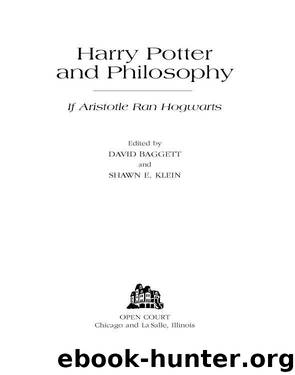Harry Potter and Philosophy by David Baggett

Author:David Baggett
Language: eng
Format: epub
Publisher: Open Court
Published: 2010-06-08T04:00:00+00:00
In order to understand how this model of moral goodness works, let us consider an example from Goblet of Fire. The backdrop for the events of this book is the Triwizard Tournament, a wizarding competition between three great schools of witchcraft and wizardry. Harry, of course, finds himself drawn into this difficult and dangerous competition as a representative of Hogwarts. One of the challenges in the competition involves rescuing a loved one from apparent drowning at the hands of Mer-People who live at the bottom of a lake on the grounds of Hogwarts. Harry must save Ron, and he does, but while doing so he notices that the sister of Fleur Delacour, one of his fellow competitors, seems likely to go unsaved. Harry risks his life to save Fleur’s sister, even though doing so is dangerous, is not required by the rules of the competition, and will likely set him back in the competition. Harry saves her anyway because he believes that if he doesn’t, then no one else will (GF, p. 503). If we look at Harry’s action from Aristotle’s point of view, we can see that his act exhibits the virtue of bravery. Harry knows what must be done and he chooses to do it—not because it will make him a hero or because it will benefit him (at the minimum the action threatens to hurt Harry in the competition)—but because it is the right thing to do. In short, Harry saves Fleur’s sister because it is what is morally required. Readers of the Harry Potter novels will have no trouble at all recognizing that this is the sort of action that Harry does habitually. Thus we can see that, according to Aristotle’s criteria at any rate, Harry is a brave person. He knows what he must do, he chooses it for its own sake, and does so consistently. He has, as a trait of his character, the moral quality of bravery or courage.81
Harry’s performance in the Triwizard tournament is a good example of the virtue of courage, but this example naturally leads us to the following question: What are virtues? Surely not every habitual action is a virtue. Only the morally good ones are. So what are those? What are the character traits that a person must have in order to be considered virtuous? Aristotle’s answer to this question is that virtues are qualities that display wisdom in the conduct of life. Aristotle argued that what sets people apart from other living things is their capacity to think, and to acquire wisdom. This unique ability of ours is what he calls our proper function. By this he means only that thinking is what makes us what we are; it is what we do. We are most human when we think, and we are best when we think well, and attain wisdom. Aristotle noted that we do not consider evil people wise, even when we consider them intelligent. Rather, wisdom and the virtues go hand in hand, and
Download
This site does not store any files on its server. We only index and link to content provided by other sites. Please contact the content providers to delete copyright contents if any and email us, we'll remove relevant links or contents immediately.
| Fantasy | Gaming |
| Science Fiction | Writing |
We Ride Upon Sticks by Quan Barry(34507)
The Secret History by Donna Tartt(19025)
Norse Mythology by Gaiman Neil(13332)
Crooked Kingdom: Book 2 (Six of Crows) by Bardugo Leigh(12300)
The Betrayed by Igor Ljubuncic(11850)
The Betrayed by Matthew Dickerson(11619)
Caraval Series, Book 1 by Stephanie Garber(10246)
Year One by Nora Roberts(9776)
Twilight Siege: A Dark Fantasy Novel (The Fae Games Book 2) by Jill Ramsower(9622)
Oathbringer by Brandon Sanderson(9604)
The Priory of the Orange Tree by Samantha Shannon(9055)
The City of Brass by S. A. Chakraborty(8859)
Red Rising by Pierce Brown(8745)
Confessions of an Ugly Stepsister by Gregory Maguire(7869)
Little Fires Everywhere by Celeste Ng(7178)
This Is How You Lose Her by Junot Diaz(6869)
Iron Flame by Rebecca Yarros(6855)
Shalador's Lady by Anne Bishop(6848)
Storm and Silence by Robert Thier(6829)
